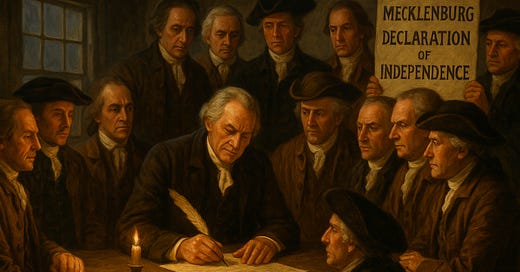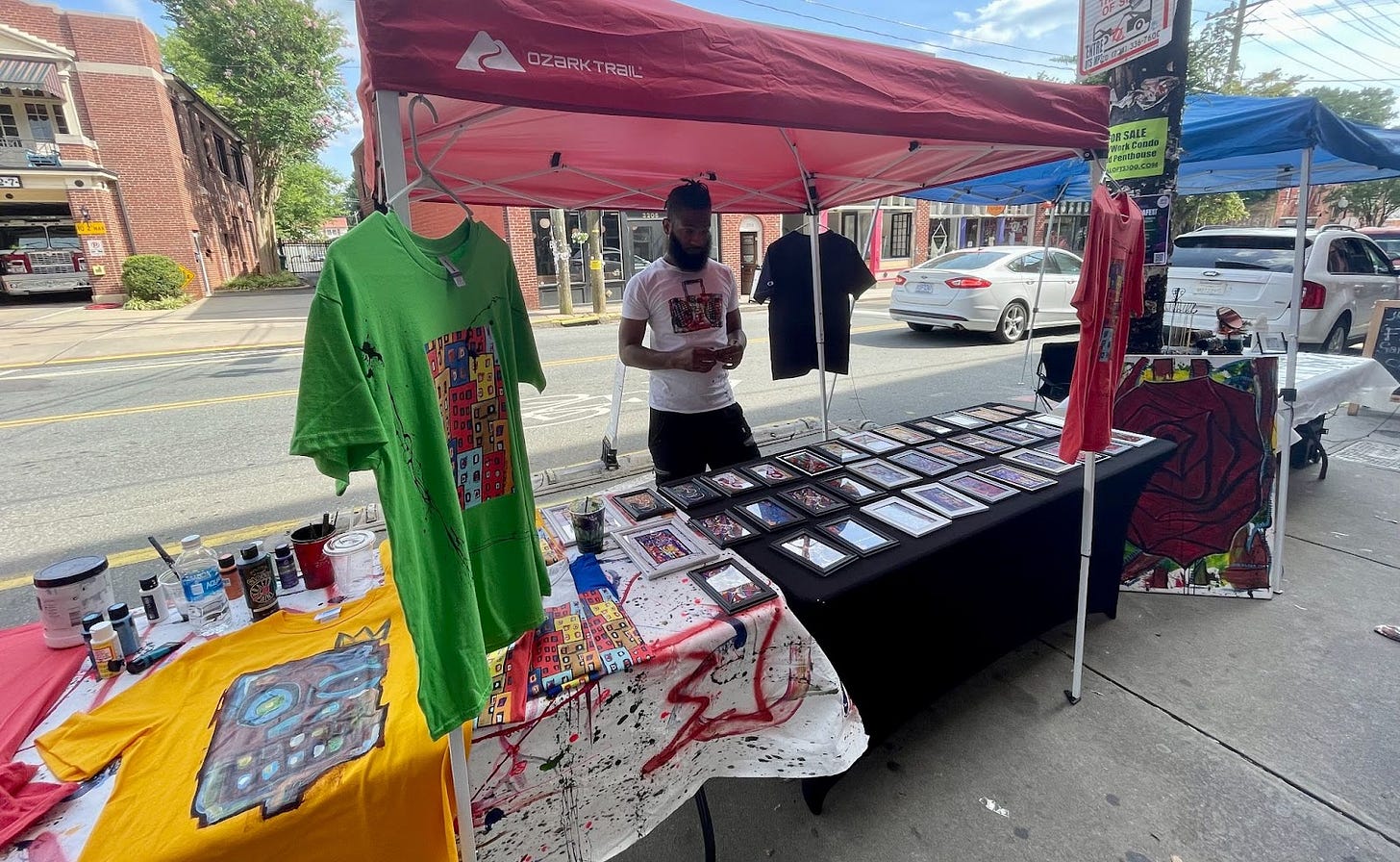Debating the Meck Dec
Plus: City plans to beef up street vending rules; 6,000 students finish at UNC Charlotte; Annie Leibovitz exhibit review at the Mint; Vi Lyles on whether she'll run for mayor again
Good morning! Today is Monday, May 12, 2025. You’re reading The Charlotte Ledger, an e-newsletter with local business-y news and insights for Charlotte, N.C.
Need to subscribe — or upgrade your Ledger e-newsletter subscription? Details here.
Today's Charlotte Ledger is sponsored by Carnegie Private Wealth. At Carnegie Private Wealth, we bring clarity to complexity. Through thoughtful planning and personal attention, we transform your financial aspirations into actionable strategies. Providing you with less stress and greater confidence in your future.
A bold declaration — or a historical mix-up? As the 250th anniversary of the Meck Dec approaches next week, a closer look at the facts
Is the Mecklenburg Declaration of Independence — known as the “Meck Dec” — real? The debate over that question has lingered for more than two centuries. But if it was, this is what its signing might have looked like, according to artificial intelligence program ChatGPT, based on the available historical information … though we seriously doubt there was a guy in the back holding a big sign. (Photo illustration by ChatGPT)
by Tony Mecia and Cristina Bolling
Expect to hear a bunch over the next week or so about Charlotte revolutionaries — and what they may or may not have done 250 years ago next week.
May 20 marks the 250th anniversary of the Mecklenburg Declaration of Independence, or “Meck Dec” for short. Maybe you’ve noticed “May 20, 1775” on the North Carolina flag. Perhaps your car has a “First in Freedom” license plate. Or have you enjoyed a Captain Jack pilsner from Olde Mecklenburg Brewery?
Those are all references to the Charlotte of 1775, a year before the July 4, 1776, adoption of the Declaration of Independence in Philadelphia.
But what are we celebrating, exactly? And what actually happened?
The answers to those questions have been hotly debated for more than two centuries. The debate over Mecklenburg’s role in America’s founding is so old that even Thomas Jefferson and John Adams weighed in.
To explore the significance and controversy surrounding the Meck Dec, The Charlotte Ledger recently hosted a panel discussion at The Sharon at SouthPark retirement community with three local experts on the topic:
Scott Syfert, cofounder of the nonprofit May 20 Society and author of the book “The First American Declaration of Independence?: The Disputed History of the Mecklenburg Declaration of May 20, 1775.”
Kendall Kendrick, executive director of the Charlotte Trail of History and the Charlotte Liberty Walk and the chairperson for Mecklenburg 250.
John Short, a local history buff who writes the “Historical Heavyweights” column in The Ledger.
🎧 We released the discussion as a podcast — you can check it out here
The gist of it all: The story goes that on May 20, 1775, a group of Charlotte leaders signed a bold declaration cutting ties with the British Crown, predating the U.S. Declaration of Independence by more than a year. Supporters claim it was a pivotal, rebellious act that helped shape the Revolution. Skeptics point to the missing original document and question whether the tale was invented decades later to burnish North Carolina’s reputation.
Evidence and arguments can be marshaled in favor of either view. Here are a few that emerged from last week’s discussion:
3 arguments favoring the Meck Dec
Eyewitness accounts. In the 1830s, North Carolina investigated the matter and found witnesses who recalled Mecklenburg’s Declaration of Independence. “They have 12 to 13 eyewitnesses,” Syfert said. “And they’re very good eyewitnesses: They’re Presbyterian ministers. They’re Revolutionary War veterans. They’re legitimate people in the community. And they all tell more or less the same story, that the Meck Dec is real.”
Revolutionary fervor. Carolinians in the Revolutionary period had well-documented skirmishes with the British over taxes and education, so a declaration declaring independence from Britain would not have been out of character. “The Meck Dec is just another piece of an example of friction between the overlords from overseas and the spirit of the founding folks of Charlotte,” Short said.
John Adams believed it. John Adams, the United States’ second president, heard the story of the Meck Dec in 1819 and believed it to be plausible. He even suggested that it might have inspired Thomas Jefferson, who wrote the Declaration of Independence.
3 arguments questioning the Meck Dec
No contemporaneous accounts. There are no newspaper articles, diary entries or copies of the documents that date to 1775. The story of the Meck Dec didn’t become widely known until 1819, nearly 50 years later, when a newspaper published an account based on a participant’s recollection.
Evidence of a similar document 11 days later. There is a newspaper account from 1775 about the Mecklenburg Resolves, a less-revolutionary declaration dating to May 31, 1775. Those didn’t declare independence. Skeptics say those who claim to have signed the Meck Dec got confused and conflated the two decades later, while also mixing it up with the Declaration of Independence.
Thomas Jefferson objects. Writing to John Adams in 1819, Jefferson said he had not heard of the Meck Dec — though it was supposedly delivered to delegates in Philadelphia — and believed the story to be false. “Would not every advocate of independence have rung the glories of Mecklenburg county, in North Carolina?” Jefferson wrote. “… Yet the example of independent Mecklenburg county, in North Carolina, was never once quoted.”
Regardless, celebrations continue this week and next week, with a scavenger hunt, panel discussions, bike ride, a tea, a moot court debate, historical exhibits and a re-enactment at Trade and Tryon streets.
➡️ For a full list of events, check out the May 20 Society website.
To go deeper, check out the latest episode of The Charlotte Ledger Podcast. It’s available on Apple Podcasts, Spotify and other podcast platforms.
Related Ledger articles:
“Historical Heavyweights: Charlotte’s revolutionary tavern keeper” (March 15)
“Blowout celebrations planned for Meck Dec milestone” (March 17)
Today’s supporting sponsor is Carnegie Private Wealth. At Carnegie Private Wealth, we bring clarity to complexity. Through thoughtful planning and personal attention, we transform your financial aspirations into actionable strategies. Providing you with less stress and greater confidence in your future.
City examines beefing up rules for street vendors, with the possibility of higher fines and expanded permit zones; potential vote by the end of June
Charlotte City Council is weighing updates to the city’s decades-old street vending rules, as tensions rise between vendors, business owners and residents in popular neighborhoods like NoDa and South End.
Street vending has become part of the fabric in areas like NoDa, but the lack of regulation has sparked complaints from brick-and-mortar business owners, who say sidewalk vendors are blocking storefronts and creating congestion on sidewalks. The Ledger first examined this issue in August 2023.
Vendors regularly set up booths along North Davidson Street in NoDa. The city is weighing new rules. (Ledger file photo from 2023)
Charlotte’s vending ordinances date to the 1980s and haven’t kept up with the city’s rapid growth. Street vending is generally allowed outside of the “congested business district,” which includes much of uptown. Within that zone, certain areas like Tryon Street are regulated through a permit program.
Compared with other North Carolina and U.S. cities, Charlotte’s enforcement tools are limited. The current fine for illegal vending ranges from just $10 to $50, and the city lacks a structured permitting system, which allows vendors to operate without one in areas like NoDa.
During a Housing, Safety and Community committee meeting last week, council members discussed several solutions, with plans to pass an ordinance or update the policy by the end of June:
Increasing fines: Implementing higher and escalating penalties for illegal vending. Some cities have fines of up to $500 for the first offense, according to Julia Martin of the city manager's office.
Expanding permit zones: Extending the Tryon Street vending program, managed by Charlotte Center City Partners, to include areas like South End.
Neighborhood-led regulation: Allowing residents and business owners in high-foot-traffic areas to petition for a “congested business district” designation, which would limit street vending in those neighborhoods.
Councilmembers Reneé Johnson and Tiawana Brown said they worried that such regulations could stifle local entrepreneurs’ opportunities to get their businesses off the ground. Mayor Pro Tem Danté Anderson, who represents NoDa in District 1, mentioned her conversations with brick-and-mortar business owners and how street vending affects their operations and clogs the sidewalks along North Davidson Street.
The city plans to gather community feedback throughout May, with proposed policy recommendations expected in June. If approved by the committee, a final vote by the full council could happen as early as June 23. —Lindsey Banks
Related Ledger article:
Graduation time: UNC Charlotte awards nearly 6,000 degrees
UNC Charlotte chancellor Sharon Gaber (left) and mascot Norm the Niner (right, with beard) greet some of the nearly 6,000 students earning degrees over the weekend at the bachelor’s, master’s and doctorate levels. The university said graduates represent 24 countries, 43 states, 82 North Carolina counties and range in age from 19 to 68. (Photos courtesy of UNC Charlotte)
Review: Annie Leibovitz retrospective reveals the humanity behind the portrait
Thousands turned out to the Mint Museum Uptown Sunday for a Mother’s Day community celebration that featured free entry to the museum and Leibovitz exhibit, photos and entertainment. (Photo by Cristina Bolling)
Ledger arts critic Lawrence Toppman recently took in the “Annie Leibovitz: Work” exhibit, which celebrates the 50-year career of the iconic photographer. It runs through Aug. 31 at the Mint Museum Uptown.
In his review for The Ledger, Toppman writes:
Leibovitz, who’s now 75, hit her stride when she went on tour with the Rolling Stones 50 years ago. We see Charlie Watts daydreaming, unlined Keith Richards napping, Mick Jagger preening while half-awake — just lads, lucky to be getting rich at their dream jobs. Yet among these light-hearted, black-and-white photos, we find one in color: an unidentified arm with a suicidal scar stitched shut, shot under a yellow light that suggests a hospital room.
Leibovitz occasionally does something dully obvious. Clint Eastwood scowls in a leather jacket; Arnold Schwarzenegger flexes in Mr. Olympia style; John Belushi and Dan Aykroyd have faces painted blue — the Blues Brothers, get it? — and Robert Redford sits by the Pacific Ocean, a blond, bland movie star on his deck.
More often she reimagines people for us. Martina Navratilova, muscled like a Greek statue, poses by a huge factory wheel, like a Soviet worker glorifying labor in Stalinist propaganda. Modern choreographer Mark Morris lounges on a couch in the forest like a native in an Henri Rousseau painting, his big belly sagging and a blissful grin on his face.
Read Toppman’s full review, with information if you want to go:
Quotable: Mayor Vi Lyles on whether she will run for re-election this year
From “Charlotte Talks with Mike Collins” last week, in which host Mike Collins asked Charlotte Mayor Vi Lyles — who has served as mayor since 2017 — if she plans to run again this year:
Q. You’ve been mayor for a long time. The election is in November. Are you going to run again?
Lyles: I’m running every day, Mike. Every day. So thank you for asking.
Q. You’re running, but does that mean you’re running for re-election every day?
Lyles: You know, as long as this community believes that we have, I have, something to contribute, then I will always try to do my very best to serve.
Q. Yeah, but that really doesn’t answer a very easy question. It’s kind of a yes-or-no question.
Lyles: Is it [easy] for you or me?
Q. Well, so you haven’t decided, is what I’m hearing you say. You’re going to assess your support, and then you will decide. Is that what I’m hearing you say?
Lyles: I think I will assess my willingness to have people support me. Yes, that’s what I’m saying.
Correction
An article in Friday’s Charlotte Ledger about the trend of painting houses white misidentified Douglas Welton’s status with the Charlotte-Mecklenburg Planning Commission. He is its current chair. Our apologies.
You might be interested in these Charlotte events: Estate planning conference, conversation on aging
Events submitted by readers to The Ledger’s events board:
MAY 21: “Estate Planning and Wealth Management Forum,” 7:15 a.m. to 5 p.m., Sarah Belk Gambrell Center for the Arts and Civic Engagement, Queens University of Charlotte, 1900 Selwyn Ave. This single-day, in-person conference offers a comprehensive educational program featuring nationally recognized experts, networking opportunities, sponsor booths, continuing education credits and more. $360.
JUNE 2: “How Old Age is like Young Age with The Ivey and Judy Goldman,” 6-9 p.m., The Ivey Brain Health & Memory Wellness Center, 6030 Park South Drive. Join us for a special event: “How Old Age is Like Young Age” — a thoughtful conversation with Charlotte author Judy Goldman on how aging reflects every stage we’ve lived through, and a deeper look into her latest memoir, “The Rest of Our Lives.” $25.
➡️ List your event on the Ledger events board.
In brief:
New Charlotte crime trend — setting grocery stores on fire? A fire that caused $500,000 in damage at a Harris Teeter off West W.T. Harris Boulevard was intentionally set, investigators said, and it took 90 firefighters an hour to get it under control. The store will be closed until further notice. It follows a fire at a Harris Teeter in south Charlotte’s Blakeney area, which was also intentionally set. (WBTV)
Earthquake shakes Charlotte: A 4.1 magnitude earthquake near the Tennessee-North Carolina border on Saturday morning was felt in Charlotte. Anastasia Williford told WSOC that she was at home drinking coffee at the time: “Honestly, I was on my phone, texting, on TikTok and the next thing you know, it started shaking,” she said. (WSOC)
City attorney clarifies his position on leaks: Interim City Attorney Anthony Fox, who insisted several times to reporters last week that it’s illegal for city council members to leak information from closed meetings, suggested in a written statement to the media on Friday that he misspoke. It can be a criminal offense to leak information from someone’s personnel file, not for elected officials to discuss closed-session meetings. (WFAE)
Tourism increasing: Tourist spending in North Carolina rose 3% in 2024, to $36.7B, a new record. North Carolina ranked No. 5 nationally for the number of tourists, behind California, Florida, Texas and New York. (WRAL)
Hungry golf fans: This week’s PGA Championship is expected to serve 130,000 8-ounce hamburgers and 90,000 hot dogs, as well as 15,000 cases of beer, 5,600 bottles of vodka and 3,200 bottles of bourbon. (Axios Charlotte)
Need to sign up for this e-newsletter? We offer a free version, as well as paid memberships for full access to all 7 of our local newsletters:
The Charlotte Ledger is a locally owned media company that delivers smart and essential news. We strive for fairness and accuracy and will correct all known errors. The content reflects the independent editorial judgment of The Charlotte Ledger. Any advertising, paid marketing or sponsored content will be clearly labeled.
◼️ About The Ledger • Our Team • Website
◼️ Newsletters • Podcast • Newcomer Guide • A Better You email series
◼️ Subscribe • Sponsor • Events Board • Merch Store • Manage Your Account
◼️ Follow us on Facebook, Instagram, X/Twitter, LinkedIn









Loved the Meck Deck article. You would be re-miss not to include "Who's Your Founding Father" by David Fleming on your suggested reading list. Fleming is a relatively new person to the Charlotte area and wrote a personal account of his search for verification of the existence of the Meck Deck. He is or was a Sports Illustrated writer and writes it in that fun, amusing, and unexpected way that SI was known for.